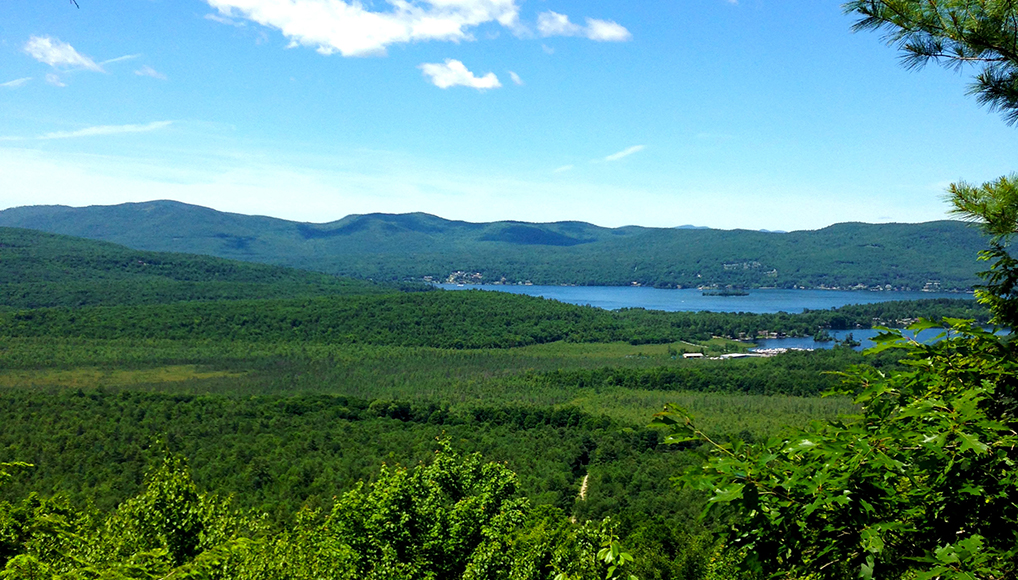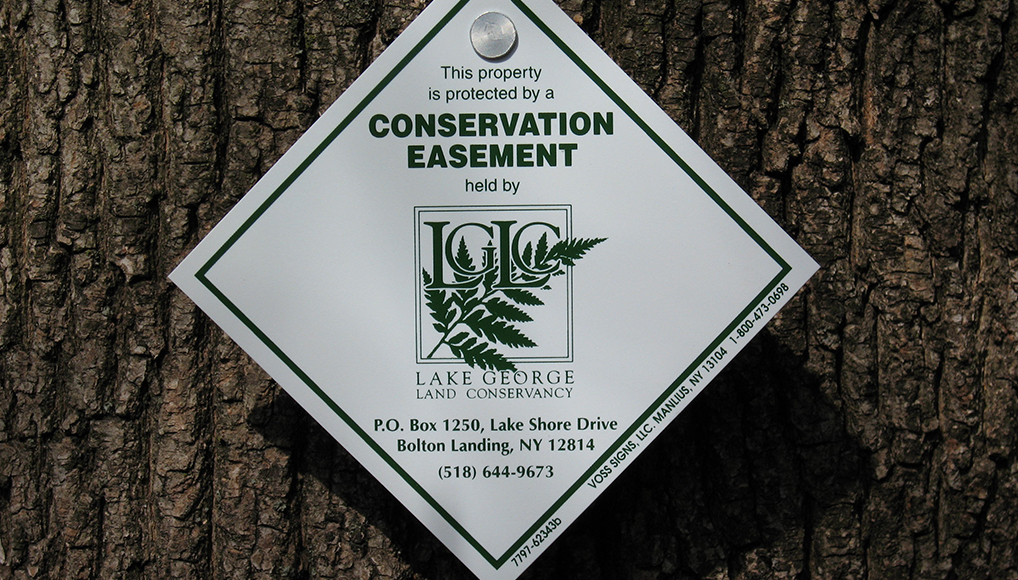Protect Your Land
The good news is that you can protect your land.
Working with a land trust (a private, nonprofit conservation organization, such as the Lake George Land Conservancy) or a conservation agency within government (such as the New York State Department of Environmental Conservation), there are many ways you can safeguard land of conservation, historic, scenic, or other natural value–but only if you make plans for your land’s preservation.

Why must you take action, when you simply want to keep your land as it is?
State and federal estate taxes are one reason. Families are sometimes forced to sell all or part of family lands in order to pay such taxes, which together can be as high as 50% of the estate’s value. And, of course, future owners may be compelled by ever-increasing property values – or simply by lack of appreciation for the land – to sell it for development

financial sense for you and your family.
Ways to Protect Your Land
CONSERVATION EASEMENT
- Leaves land in private ownership.
- Can result in an income tax deduction, estate tax reduction, and possibly reduced property taxes.
A conservation easement (or land protection agreement) is a legal agreement between a landowner and a land trust or conservation agency that permanently limits the uses of the land in order to protect its conservation values. It allows you to continue to own and use your land and to sell it or pass it on to heirs.
When you donate a conservation easement to a land trust, you permanently give up some of the rights associated with the land. For example, you might give up the right to build additional residences, while retaining the right to grow crops. Future owners also will be bound by the easement’s terms, and the land trust is responsible for making sure the easement’s terms are followed.
Conservation easements are flexible land protection tools. A land protection agreement on property containing rare wildlife habitat might prohibit any development, for example, while one on a farm might allow continued farming and the building of additional agricultural structures. A land protection agreement can allow appropriate development and even permit some commercial use of the land. It may apply to just a portion of the property, and need not require public access. In short, an easement must protect the land’s conservation values, but it also can be fashioned to meet the financial and personal needs of the landowner.
A conservation easement donation that meets federal tax code requirements – in essence, that provides public benefit by permanently protecting important conservation resources – can qualify as a tax-deductible charitable donation. For income tax purposes, the value of the donation is the difference between the land’s value with the easement and its value without the easement. Additionally, conservation easement donations can provide important estate tax benefits, even if the conservation easement is donated after the family property is in an estate.
Placing an easement on your property also may result in property tax savings.
Perhaps most important, a conservation easement can be essential for passing land on to the next generation. By removing the land’s development potential, the easement lowers its market value, which in turn lowers estate tax. Whether the easement is donated during life or by will, it can make a critical difference in the heirs’ ability to keep the land intact.
LAND DONATION
- Can result in a substantial income tax reduction.
- Can be structured in a way that allows you to continue to live on the land or to receive a life income
Donating land for conservation purposes is truly one of the finest legacies a person can leave to future generations. It may be the best conservation strategy for you if you do not wish to pass the land on to heirs; own property you no longer use; own highly appreciated property; have substantial real estate holdings and wish to reduce estate sales tax burdens; or would like to be relieved of the responsibility of managing and caring for land.
An outright donation of land to a willing land trust releases you from the responsibility of managing the land and can provide substantial income tax deductions and estate tax benefits (while avoiding any capital gains taxes that would have resulted from selling the property). Most important, if the land is donated because of its conservation value, it will be protected. (Although our focus here is on conservation land, commercial and residential properties also can be donated to a land trust, with the understanding that they will be sold to support the land trust’s conservation work).
BARGAIN SALE OF LAND
- Combines income-producing benefit of sale with tax-reducing benefit of donation.
If you need to realize some immediate income from your land, yet would like the property to go to a land trust, a bargain sale might be the answer. In a bargain sale, you sell the land to a land trust for less than its fair market value. This not only makes it more affordable for the land trust, but offers several benefits to you: it provides cash and entitles you to a charitable income tax deduction based on the difference between the land’s fair market value and its sale price.
Contact Us
Our staff can help you arrive at a conservation plan that makes the most sense for you, and can provide to you lists of attorneys, appraisers, accountants, and land planners who are experienced with conservation techniques. Please email our Executive Director Michael Horn, call 518-644-9673, or use our contact form to request more information.
The brief explanations provided here are intended only to give you an idea of what can be done. You should make decisions affecting the ownership and use of your property only after careful consideration and professional consultation.
This information is intended to be accurate and authoritative in regard to the subject matter covered. It is provided with the understanding that the LGLC is not engaged in rendering legal, accounting, or other professional service. If legal advice or other expert assistance is required, the services of experienced professional advisers should be sought. Much of the material set forth here has been graciously provided by the Land Trust Alliance.
Protecting the land that protects the lake since 1988. The Lake George Land Conservancy is an accredited not-for-profit land trust dedicated to working with willing landowners and other partners to protect the world-renowned water quality of Lake George and to permanently preserve the natural, scenic, historical and recreational resources of the Lake George Region.

